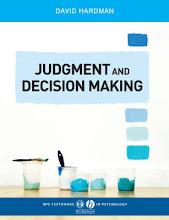In the 1960s some psychologists formed the view that people were "intuitive statisticians", but in the 1970s this gave way to a new view of people as "irrational" due to their apparent reliance on heuristics. Hertwig et al (2008) have pointed out that these views were formed on the basis of different types of task. The earlier types of task tended to be "pure applications of probability theory", such as the following: "You toss two coins. What is the probability that both coins come up heads on this toss?" By contrast, the latter problems were more everyday types of task, such as the Linda problem discussed in the previous blog.
Hertwig et al also noted that participants in probabilistic reasoning studies are typically university students. They conducted a telephone survey of 1000 adults in Switzerland, whose numbers had been randomly selected by computer. Each person was presented with four "pure" probability problems and two "everyday" probability problems. As expected, they found a higher level of performance on the pure problems. Moreover, on these problems higher levels of educational achievement were associated with higher levels of reasoning performance.
On the everyday problems, there was actually a tendency towards poorer performance by the most highly educated respondents. This appears to be inconsistent with previous research in which the SAT scores of the American participants were recorded.
Finally, people with some gambling experience also showed a slight performance advantage, as did male participants relative to women.
The study does appear to assume that education is a causal factor in producing correct probabilistic responses on the pure problems. However, the study does not actually distinguish between the cognitive ability of the respondents and their education; or to put it another way, those with higher cognitive ability are more likely to go on to higher levels of education in the first place. Likewise, does gambling experience confer a better understanding of probabilitistic problems, or is it just that people with better understanding are more likely to gamble?
Reference
Hertwig, R., Zangerl, M.A., Biedert, E., and Margraf, J. (2008). The public's probabilistic numeracy: How tasks, education and exposure to games of chance shape it. Journal of Behavioral Decision Making, 21 (4), 457-470.
Corrections and clarifications
There is an error in Figure 3.3. This is the tree diagram representing Eddy's (1982) medical problem. For the branch representing P(Negative | Cancer) the probability should be 0.208, NOT 0.028. Accordingly, the number at the rightmost end of the branch should be 0.0028, NOT 0.00028.
This does not affect the answer to the problem stated in the text, which remains 0.077.
My thanks to Chloe Turner (one of my students) for pointing this out.
Thursday, 4 June 2009
Subscribe to:
Post Comments (Atom)
About Google Analytics
This website uses Google Analytics, a web analytics service provided by Google, Inc. (“Google”). Google Analytics uses “cookies”, which are text files placed on your computer, to help the website analyze how users use the site. The information generated by the cookie about your use of the website (including your IP address) will be transmitted to and stored by Google on servers in the United States . Google will use this information for the purpose of evaluating your use of the website, compiling reports on website activity for website operators and providing other services relating to website activity and internet usage. Google may also transfer this information to third parties where required to do so by law, or where such third parties process the information on Google's behalf. Google will not associate your IP address with any other data held by Google. You may refuse the use of cookies by selecting the appropriate settings on your browser, however please note that if you do this you may not be able to use the full functionality of this website. By using this website, you consent to the processing of data about you by Google in the manner and for the purposes set out above.




No comments:
Post a Comment